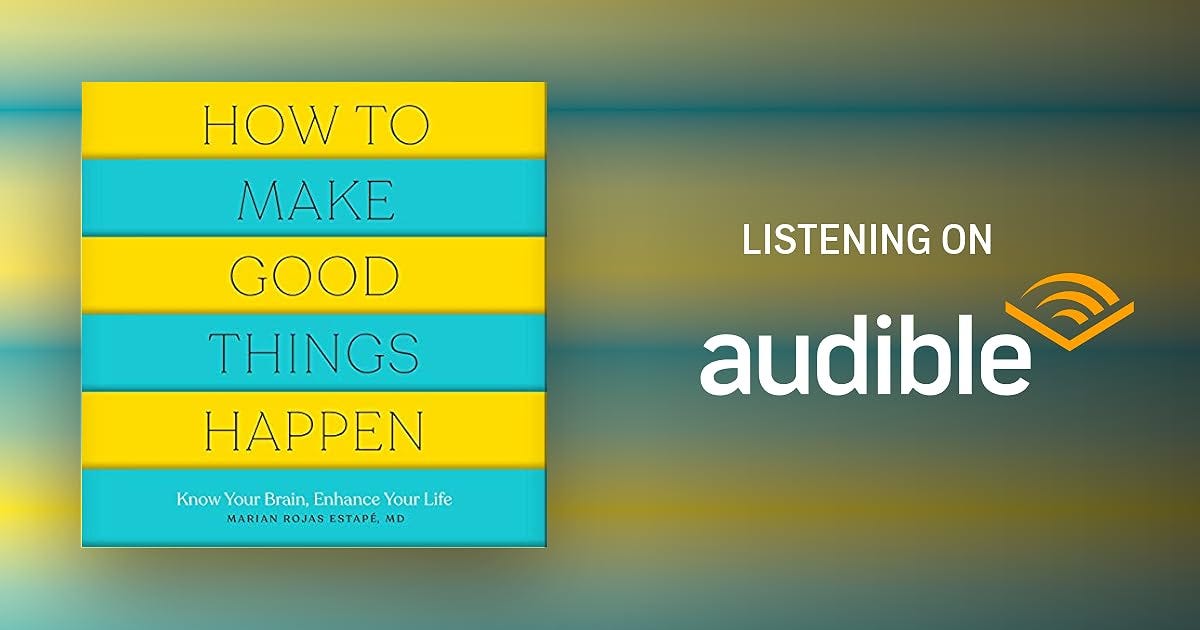Hola Amigos,
This week we are diving into How to Make Good Things Happen. That’s the title of one of my favorite books by Spanish psychiatrist, Marian Rojas Estapé.
Estapé combines neuroscience and psychology to explain how we can rewire our brains for success. Below are key insights from her work and how you can apply them to build an effective mindset.
I bought this book after a really low point in my life and it made a huge difference. I hope these insights help you too!

1. Your Brain is Your Best (or Worst) Ally
Estapé explains that our thoughts shape our neurochemistry, influencing motivation, decision-making, and resilience.
Negative thought loops (e.g., "I’m not good enough," "This will fail", “Everything is going to hell”) trigger cortisol (the stress hormone), impairing cognitive function. I used to be my worst critic, but then after college I noticed highly incompetent people who were very confident in themselves and noticed how far they would get in life. I then started practicing becoming my biggest fan and it helped me build the confidence to open amazing doors in my career.
Purpose-driven thinking (e.g., "What can I learn from this?", “How can this help me become sharper in my craft?”, “How can I position myself to win next time?”). This mindset boosts dopamine, enhancing focus and drive. Power yourself up with motivational words. What is the reason behind everything you are doing? What’s the point? What is it for? Write those things down and let the answers be your center to stay focused.
→ Action: Start your day with a "focus question" (e.g., "What’s one thing I can do today to move forward?") to prime your brain for proactive thinking. Every day I ask myself this question. If I finish the top 1 - 3 most important things, I feel accomplished at the end of the day.
2. Emotional Intelligence > IQ in Career Advancement
Estapé highlights that 90% of top performers have high emotional intelligence (EQ, not just raw intelligence.
Self-awareness: Recognize when stress or ego is clouding your judgment.
Empathy: The best leaders listen deeply and connect authentically. They ask curious questions.
Impulse control: Pause before reacting, respond strategically instead.
→ Story: A CEO client of Estapé’s struggled with angry outbursts until he learned to label his emotions (e.g.,"I’m frustrated because X happened"). This simple habit reduced conflicts and improved team trust. Journaling can help with the process of reflecting on the emotions that you are experience and the why behind them.
3. The Resilience Formula: Stress + Recovery = Growth
Stress without recovery leads to burnout. But managed stress + deliberate recovery = resilience. My former CRO at Twilio used to say, “Crush your goals, but don’t crush your people.” I love this mindset!
Estapé’s research: People who practiced micro-recovery habits (e.g., 5-minute breathing exercises, short walks) maintained higher performance under pressure. Every Monday after lunch, I go on coffee walks with my team at Notion. It’s usually the highlight of my day and powers up the afternoon to finish the day strong.
Sleep is non-negotiable: Poor sleep reduces decision-making ability by up to 50% (Harvard research).
→ Try this: Use the "90-Minute Focus Block" (work intensely, then take a 10-min recovery break) to sustain peak mental performance. Every 90 minutes I go on water breaks, short walks, or go to the bathroom two floors above me (taking the stairs). I get a little workout and it boosts my dopamine levels!
4. The Success Magnet: Gratitude & Optimism
Estapé cites studies showing that grateful people attract more opportunities. Why?
Gratitude increases serotonin (mood stabilizer) and oxytocin (connection hormone).
Optimism doesn’t mean ignoring reality, it means focusing on solutions and in hope that things will work out!
→ Exercise: End each day by writing 3 professional wins (e.g., "Nailed the presentation," "Got a step closer to close a deal", “Accomplished my most important KPIs”). This trains your brain to spot opportunities and acknowledge wins.
5. The #1 Habit of High Performers: Ownership
Estapé argues that the most successful people take radical responsibility.
Instead of:
❌ "My team failed me."
✅ "How could I have set them up for success?"
This mindset shift unlocks problem-solving and influence. I have deep respect for leaders at companies that take ownership of the strategy and work with individual contributors in the front lines to understand the challenges they are experiencing. Great leaders partner with them to come up with creative solutions. This shows radical responsibility and extreme ownership.
Final Thought: Good Things Don’t Just "Happen", You Create Them
Good things are sometimes random, but steady good things are the result of intentional thinking, emotional mastery, and disciplined habits.
Which of these strategies will you apply in your daily life? I’d love to hear your thoughts.
Cheers to making good things happen!
Andy Cabistan




